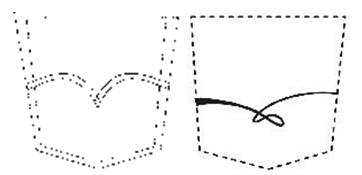Guest Post: Bob Cumbow's Musings on Rescuecom Keyword Advertising Case
 Following is a teaser guest post by my partner, Bob Cumbow (though this and the last paragraph are mine):
Following is a teaser guest post by my partner, Bob Cumbow (though this and the last paragraph are mine):
For some time now, “keyword search advertising” has been a marketplace reality in the US. In the typical keyword search advertising situation, a search engine sells to an advertiser the right to have the advertiser’s ad or sponsored link appear whenever a user of the search engine inputs a particular search term. It’s become a common practice for search engines to suggest, and advertisers to choose, search terms that are the trademarks of the advertisers’ competitors. Thus, when a user keys in the name of a particular company, the resulting search results may be accompanied by an ad or sponsored link to a direct competitor of the company whose name was keyed in.
For several years, competitors have been using one another’s names in this way, while simultaneously asking whether this activity actually raises a legal issue over which a lawsuit could be filed. Indeed, several such lawsuits have been filed, and courts have differed in their findings. For the most part, courts have been troubled by whether keyword search advertising constitutes a “use” of another party’s trademark; because if it doesn’t, then there is no basis for a trademark infringement lawsuit. Most courts have found that it does constitute a use of a trademark, but have gone on to find either no liability for trademark infringement, or liability only on the part of the advertiser, not the search engine.
Recently the Second Circuit Court of Appeals handed down its long-awaited opinion in Rescuecom v. Google, reversing a longstanding trend in that circuit, and holding that keyword search advertising is indeed a use of another party’s trademark for which a search engine might be liable. What is the significance of this holding? What problems does it raise? And where does keyword search advertising go from here?
Bob answers these questions in his insightful article here. It’s a great read.
InsideCounsel Reports on Contrasting BlockShopper and Dozier Linking Lawsuits
 InsideCounsel always seems to have a good trademark story. The May issue is no exception. There’s a good recap of the Jones Day v. BlockShopper hyperlinking-is-trademark-infringement lawsuit, including a nice quote from University of Michigan Professor Jessica Litman:
InsideCounsel always seems to have a good trademark story. The May issue is no exception. There’s a good recap of the Jones Day v. BlockShopper hyperlinking-is-trademark-infringement lawsuit, including a nice quote from University of Michigan Professor Jessica Litman:
“If it had gone to trial, BlockShopper would have won. That’s why Jones Day stopped pursuing this. BlockShopper settled because its legal bills were getting out of hand, and trial is incredibly expensive.”
The article also contrasts the BlockShopper case with Dozier Internet Law v. Riley, in which attorney John Dozier sued Ronald Riley in Virginia state court for hyperlinking Mr. Dozier’s firm’s name on Mr. Riley’s Web site with another Riley Web site that criticizes Mr. Dozier’s firm.
The article quotes Mr. Riley’s lawyer, Public Citizen attorney Paul Levy, as arguing: “Jones Day says, ‘if you link to my site it is trademark infringement.’ Dozier says, ‘if you link to another site it is trademark infringement.’ Both Dozier and Jones Day can’t be right.”
Hopefully neither is right.
Upcoming Talk: How Bands Should Protect Their Brand
I’m working on a talk I’m giving on Wednesday: “Bands & Brands: Essential Trademark Law for Musicians.” It’s long been an interest of mine but the first time I’ll be presenting on the subject. Here’s a rough outline of my plan:
- Trademark basics
- Searching and clearing trademarks
- Ownership issues
- Licensing essentials
- Right of publicity
- Trademark protection strategies
The talk is sponsored by the Washington Lawyers for the Arts. It’s at The Vera Project, at the corner of Republican Street and Warren Avenue North, one block north of Key Arena. The program starts at 6 p.m. and will go until 7:30 with questions. Hopefully it will be quite interactive.
Cost is $35 for attorneys and paralegals ($40 at the door), and $10 for artists and students ($15 at the door). It’s approved for 1.5 hours of CLE credits. Register here; more info here. Hope to see you there!
Court Finds Abercrombie's Stitch Design Does Not Dilute Levi's Stitch Design

Not identical or nearly identical, so no dilution:
Levi’s “Arcuate” and Abercrombie’s “Ruehl” stitch designs
In 2007, Levi Strauss & Co. sued Abercrombie & Fitch Trading Company in the Northern District of California for trademark infringement, unfair competition, and dilution. On Dec. 22, 2008, a jury rendered a verdict in Abercrombie’s favor on the infringement and unfair competition claims. With the parties’ consent, the jury provided advisory opinions on certain factual issues related to the dilution claim. On April 22, Judge Jeffrey White rendered the court’s findings of fact and conclusions of law on Levi’s dilution claim. In summary, the court found that the subject marks (depicted above) were not “identical or nearly identical,” so Levi could not prevail on its dilution claim.
The court found: “The advisory jury found that [Abercrombie’s] Ruehl design and [Levi’s] Arcuate mark were not identical or nearly identical. In order to be nearly identical, the two marks must be similar enough that a significant segment of the target group of customers sees the two marks as essentially the same. ‘In the dilution context, the ‘similarity of the marks’ test is more stringent than in the infringement context.’
“The evidence demonstrates [that Levi] has expended significant amounts of money advertising the Arcuate mark. Dr. Snood’s Recognition Survey also lends support to the conclusion that the Arcuate mark is recognized by the public. However, even if the Arcuate mark is a strong and distinctive mark, this is not a case where the two marks at issue involve only minor differences, which might weigh in [Levi’s] favor. A & F also has not incorporated the Arcuate mark into the Ruehl design as a ‘separate, visually identifiable element.’
“… Here, the Arcuate mark consists of two parallel lines stitched in two symmetrical arches that meet at a point in the middle of the back pocket. In contrast, the Ruehl design is not ‘virtually indistinguishable’ from the Arcuate mark. Rather, it consists of an embroidered script ‘R’ that was flipped upside down and the legs extended to the edges of the pocket. The Ruehl design also sits lower on the pocket, and the right and left back pocket designs create a mirror image of each other. Although the legs of the upside down ‘R’ create a slight arch, the central feature of the design is a unique swooping loop toward the center of the pocket. None of the Arcuate designs in evidence has a ‘dipsy doodle’ or any kind of infinity loop under them. This evidence demonstrates that a significant segment of the target group of customers would not view the marks as essentially the same.”
Given these findings, the court concluded that Levi did not establish that Abercrombie is making commercial use of a mark that is identical or nearly identical to Levi’s Arcuate mark.
The court also adopted the advisory jury’s finding that the Ruehl design was not likely to cause dilution by blurring because Abercrombie did not intend to create an association with Levi’s Arcuate mark.
The case cite is Levi Strauss & Co. v. Abercrombie & Fitch Trading Co., No. 07-3752, 2009 WL 1082175 (C.D. Calif. April 22, 2009) (White, J.).
Gallo Sues Seattle Retailer for Selling Spanish-Made Gallo-Branded Pasta

On April 13, E. & J. Gallo Winery filed a trademark infringement suit in the Eastern District of California against Seattle-based speciality food store The Spanish Table, Inc. (which also has stores in Santa Fe, Berkeley, and Mill Valley, Calif.).
Gallo alleges that The Spanish Table sells Spanish-made GALLO pasta, which is likely to cause confusion with Gallo’s GALLO trademark for wines, meats, and cheeses. The complaint states that “gallo” means “rooster” in Italian, and the winery used to feature roosters on its labels. (“Gallo” also appears to mean “rooster” in Spanish, pronounced “Guy-o”). The complaint alleges that Gallo obtained the Spanish company’s agreement not to sell its goods in the United States and Puerto Rico. The Spanish company is not named in the lawsuit.
Local coverage with copious comments here. From the story, it sounds like The Spanish Table will stop selling GALLO pasta and the lawsuit will go away. Hope that’s how it works out.
The case cite is E. & J. Gallo Winery v. The Spanish Table, Inc., No. 09-677 (E.D. Calif.).